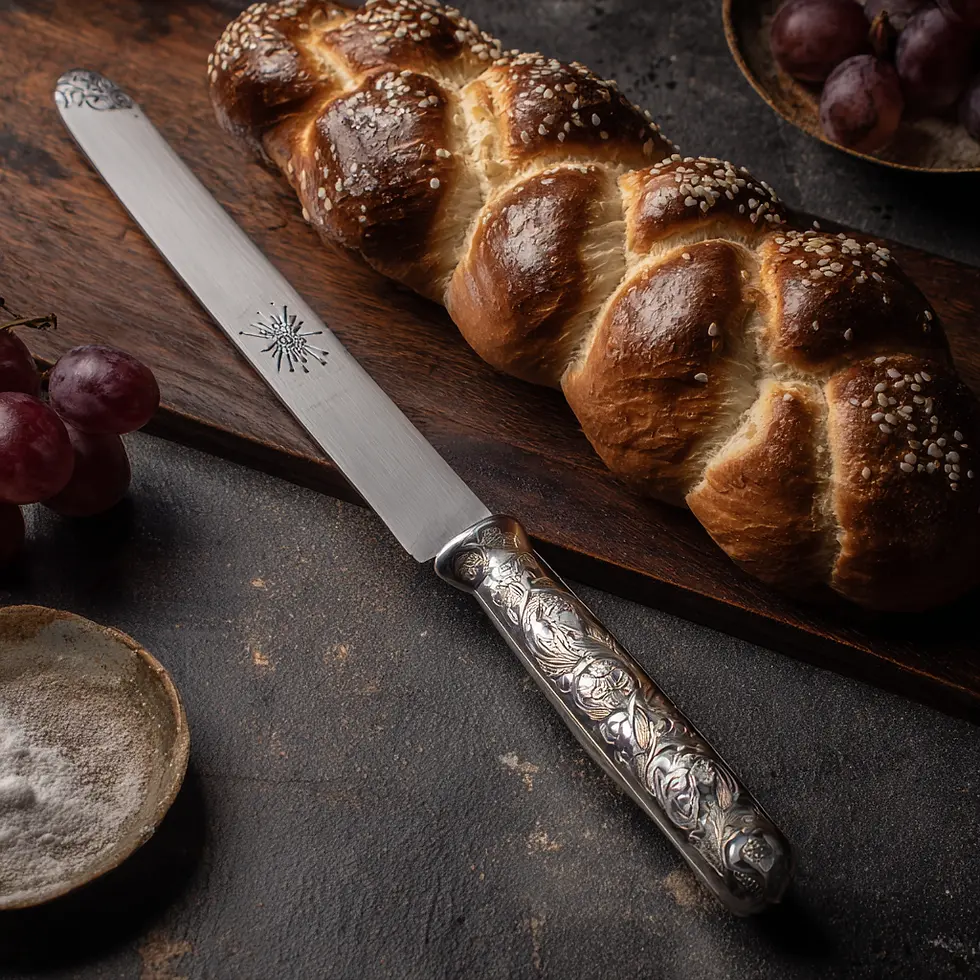The Sword in the Dough
- Chloe Botbol
- Sep 10
- 4 min read

We’re less than two weeks away from Rosh Hashanah.My husband, who’s serving in the army, asked me to pick up a drone for him and send it along with some challot for Shabbat. It’s not easy for me to step into the shoes of a real, Jewish, Israeli woman—the wife of a soldier. But I know this is the only way forward for me. So I carry the weight of my worry, held and supported by a vast community of women in the same situation.
Together, we hold hands as our husbands respond to a deep calling within them.
We can't control their lives, I realize.
All those serving in reserve duty could, technically, avoid it. They could find excuses. The army doesn’t punish so severely once you’re out of mandatory service. Knowing this, they still choose to serve. And in our hearts, we know it.
But that also means… they’re choosing to put us through holding the home alone. Unless—maybe—they’re not choosing that part. Maybe it’s just a consequence of their choice. And we, the wives who love our soulmates, we know what this entails.
And so, in a way, the choice isn’t just theirs—it’s ours too. They may lead the way, but the mitzvah is a shared one, tying us to a great responsibility. While our physical paths seem to diverge, our spiritual paths collide and merge more deeply than ever.
This is the story I want to share—because it still gives me chills when I think about it.
So I’m baking the challot. And I know they’re destined to be eaten by my husband’s whole team. And as I’m kneading and shaping, I catch myself hoping they’ll taste really good… so all his teammates will think, “Wow, his wife is such a good cook.”
And then I stopped.I thought: Really? That’s the intention I’m putting into these challot? My pride?
Pride is just emptiness. It serves the self, but what are we in and of ourselves in this world? Empty shells. The only way we truly exist with substance is because we’re connected to Hashem. He fuses us with life, every second.
The moment I focus on serving myself, I lose that essence. Pointless.
My husband is serving in Hashem’s army, and I’m over here worried about how many people will remember my challot?
Slightly ridiculous.
So right then and there, I corrected my approach and did teshuva.
I said to Hashem:"Please, let my truest intention be that these challot bring them joy—not for my sake, but so that their joy connects them to the beauty and sweetness of Shabbat. That even in this wasteland we call Gaza, they may feel awe, feel Yirat Shamayim. Let this small pleasure connect them to life. And through that connection, may they serve You with passion, with presence, with heart. May they be inspired."
A few hours later, as I pulled the challot out of the oven, basking in their smell from Olam HaBa, I heard a knock at the door.
No one was there.
But just as I was about to close it, I looked down and saw a small, long rectangular package.
I bent down, picked it up, curious.When I opened it, I saw the label: Hidabroot—the organization of Rav Zamir Cohen, to whom my husband has been donating his ma’aser.
And inside: a challah knife.A beautiful, silver-plated, engraved challah knife to slice Shabbat bread with awe and kavod.
I had been dreaming of getting a knife like that. And there it was, at my door, just as I pulled this very intentional batch of challot from the oven.
It looked like a sword.
And I understood: Hashem was showing me that this—the mitzvot—are the swords of Am Yisrael.They cut through lies. They cut through ga'avah (pride)—which is disconnection from Him.
When we connect to Him, we win every war. And we help bring redemption—not just to ourselves, but to the entire world.
When I told this story to my Rebbetzin, she added (not without emotion) that there’s a minhag to buy a new knife before Rosh Hashanah.It symbolizes cutting through the din, the harsh judgments—and drawing mercy instead.
And I understood something else:Letting go of pride—that too is mesirut nefesh.
It means surrendering the body’s desire to be glorified for no reason. It’s how we draw protection, kapara, and bracha upon ourselves.
Just as my husband gave his body to serve Hashem in the army, I gave up my pride to be seen as “a good cooking wife.”
And that small shift drew down a blessing I could never have expected.
We, the wives of soldiers, may not realize the impact of what we do—every second of the day—in quiet partnership with the men on the front lines.
We may not see it, but we are healing Am Yisrael by simply doing Hashem’s will, keeping His mitzvot, and working—again and again—to stay connected to Him.
The role of a man and the role of a woman are different. The places where we work and elevate this world are different.But ultimately, we are two sides of the same coin.One neshama.
And I know we will win, because Hashem is with us.
All this made me wonder…Maybe I should bake challot every time a patient comes in for therapy.Maybe the smell alone would awaken the soul even more than anything therapy can do.

Comments